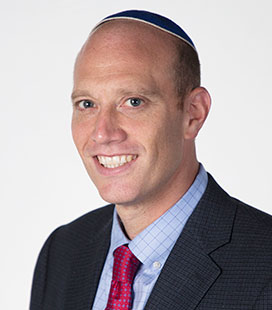
Joseph Shatzkes, MD, cardiologist
The New Year is an opportunity to make a fresh start and refocus our minds on taking good care of our health, in particular, our heart. Dr. Joseph Shatzkes, a board-certified cardiologist who focuses on general cardiology and prevention, shares some wisdom on making a good start for your heart in 2018.
What advice can you give about making resolutions?
Set realistic goals. I tell people it’s a marathon, not a sprint. When it comes to your heart, you want to make changes that you can continue lifelong. Set realistic goals, so you do not get discouraged.
What first steps do you recommend?
Exercise. Finding ways to exercise is the first step toward a healthier heart. Aim for 30 minutes of moderate exercise five days a week. It can be as simple as going for a brisk walk. I tell my own dad, “Get off the subway a stop earlier. Walk the extra 10 blocks.” Getting your heart rate up is a good place to start.
Get an internist. Have a doctor with whom you have a good relationship.
Look at your own personal risk factors. If you have a sibling or parent who had cardiovascular disease, come in for an evaluation. Modifying risk factors can be very important for your own health.
What are your top tips for the New Year?
Diet. Let’s face it, the holidays and winter are really tough. I suggest that people focus on goals. I preach moderation.
Quit soda. Quit drinking all soda. You’ll lose weight just by quitting soda, including diet sodas. Quitting soda can be a springboard to a healthier lifestyle.
Don’t eat late at night. The last thing you do for the evening shouldn’t be food. Doing something after dinner can make a difference. In my family, we go for a walk around the neighborhood after dinner. We’ve incorporated walking into our routine. My kids know it as going for a “moonlight walk.”
Lower your carbs. One thing you can do easily is focus on reducing your carbohydrate intake. Eat more protein.
Limit salt. If you have borderline high blood pressure, limit your salt intake. This doesn’t mean you have to cut it out completely, but start reading labels and become aware of how much salt is in your food.
Exercise. Exercise will help lower your blood pressure and increase your energy. It can help reduce the number and amount of medications you need to be on.
Quit smoking. Most of the time when we see young people—such as people in their 40s—with heart disease, they are smokers. If you smoke, your New Year’s resolution should be, “I quit yesterday.”
Get support. I’m a big fan of ancillary practitioners, such as nutritionists and personal trainers. They are good resources, especially for heart patients.
Be a “cheater”. Whether it’s improving your diet, exercising every day, or reducing your stress, focus on doing that thing most of the time. Being a cheater means that you’ve quit something and you cheat only occasionally.
How do you incorporate heart healthy practices into your own life?
I’m at the gym at 6 a.m. several mornings a week. I used to be a little heavier and I lost weight. It’s not easy, but I focused on it. I limit my snacking and try to keep it to fruit or nuts or other healthy options. A decade ago, I gave up soda. If I need to get moving, I ask my wife if she needs anything at the store and I’ll run an errand. I try to go do something rather than just sit.
I’m a big sports fan. I often exercise while watching my teams. During the Sunday football game, I try to go for a walk at halftime, so that I don’t spend the whole three hours just sitting on the couch.
If someone has worrisome symptoms, how do you encourage that person to address them now?
As doctors, sometimes what we do is rule things out and reassure patients. Addressing something early is better than waiting. Early action can prevent so much down the road. Never be afraid to come in.
What about people who are afraid to go to the doctor?
Going to the doctor does not have to be a cold experience. In my practice, we try to be super friendly and not scary. I like getting to know my patients as people . . . their families, their interests. I like seeing them in the community. I run into my patients at ShopRite!
For me, there is no greater joy than being able to take care of my neighbors and help them feel healthy. People know that they can rely on me to take care of their health. That’s why I became a doctor.
What makes Englewood Hospital so special?
As a patient, you can come to Englewood Hospital and get the tender loving care of a community hospital without compromising any of the expertise or technology. Our interventional cardiologists and cardiothoracic surgeons are superb. They perform advanced procedures, such as TAVR, that are often found only at academic medical centers, with outstanding results. I feel blessed to have joined a great group of academic cardiologists. In our practice, the patient comes first. We make it a priority to be available and to get patients in the next day if needed.
Posted December 2017
